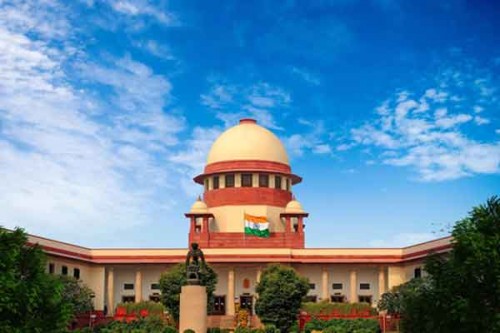SC slams TN govt for denying permission to conduct religious events on Ram Temple consecration event; issues notice

New Delhi, Jan 22 (IANS) The Supreme Court on Monday slammed the Tamil Nadu government for denying permission to conduct Annadanam (special almsgiving) on the occasion of the Ram Temple consecration ceremony on the ground of “lower number of Hindu residents” in a village predominantly inhabited by Christians.
“We are making it very clear that you (state government) do not reject events for this reason. Yes, if there is a law and order situation, you can regulate. We have made it very clear that we want to know the reasons for denial of permission. If this is the reason going to be given, you would be in a problem,” a bench headed by Justice Sanjiv Khanna told senior advocate Amit Anand Tiwari, who appeared on behalf of the Tamil Nadu government.
The bench, also comprising Justice Dipankar Datta, was hearing a plea alleging that the DMK-led state government has banned live telecast of Ram Temple 'Pran Pratishtha' ceremony in all the temples across Tamil Nadu and has also banned all kind of poojas, archana, Annadanam (poor feeding) and bhajans on the occasion.
The petition annexed an order passed by Dindigul district Deputy Superintendent of Police on January 20 denying permission to Sri Bhagavatiyamman Temple to conduct special almsgiving (Annadanam), inter alia, on the ground that the area of A. Vellodu village is predominantly inhabited by Christians and due to the lower number of Hindu residents, there is a possibility of encountering cultural sensitivities or legal complications related to public peace and morality.
Reacting sharply, Justice Datta said: “If the order is to be made applicable across Tamil Nadu, wherever there are minorities, they will never be able to hold a prayer meeting."
Issuing notice on the plea, the apex court recorded the oral statement given by Additional Advocate General that there is no ban on live telecast and organisation of any religious rituals on the occasion of the auspicious occasion of 'Pran Pratishtha' of Lord Ram at Ayodhya.
Further, the top court ordered the authorities of the state government to decide the application seeking permission in accordance with law and to record reasons, in cases of rejection.
“The authorities will also maintain data with regard to the applications received and the reasons given for allowing and disallowing such applications,” it said.
The matter is likely to be taken up for further hearing on January 29.

|

|

